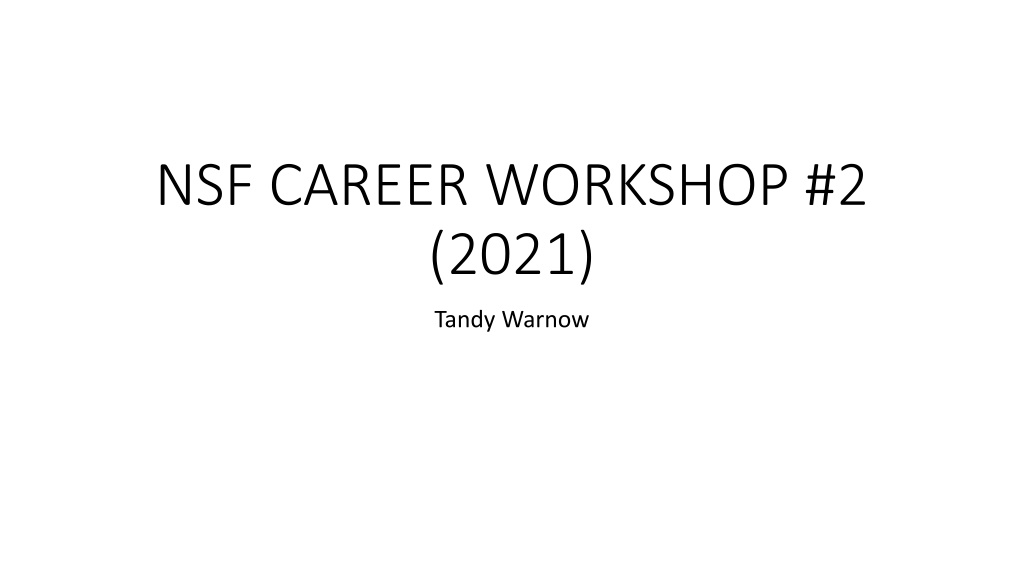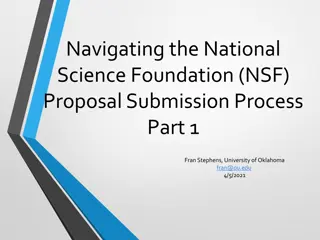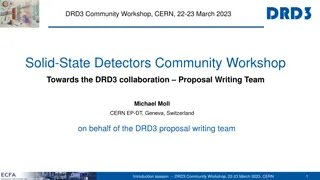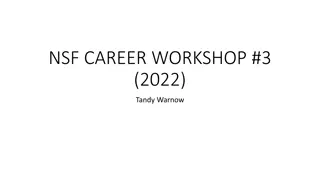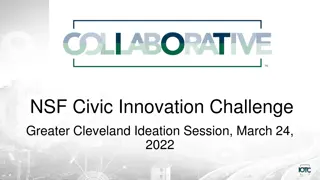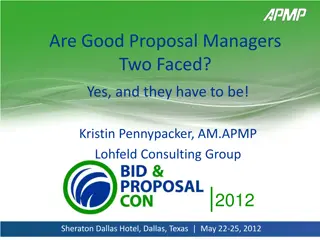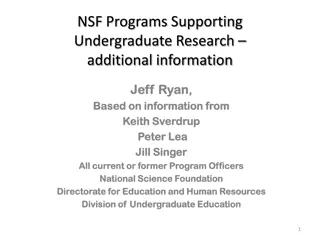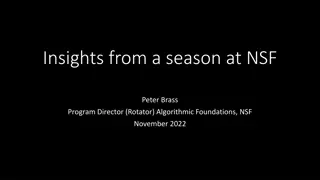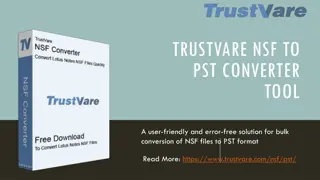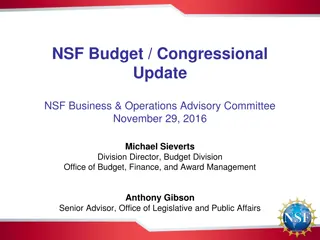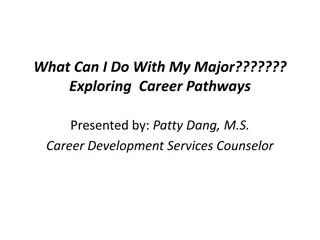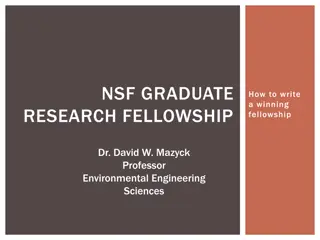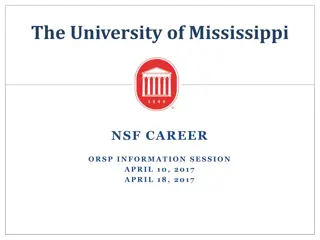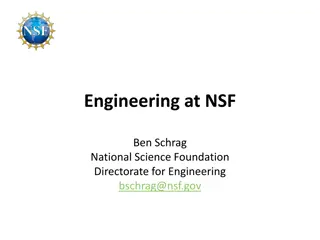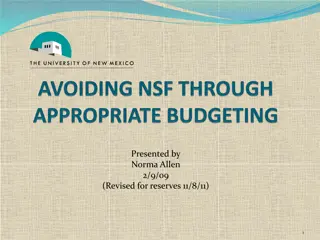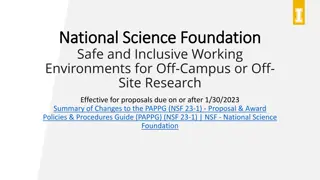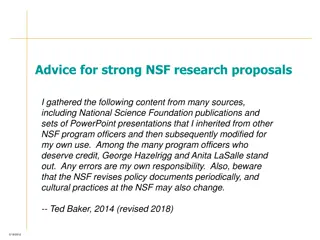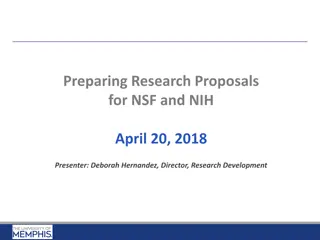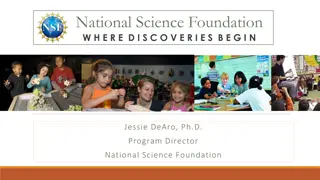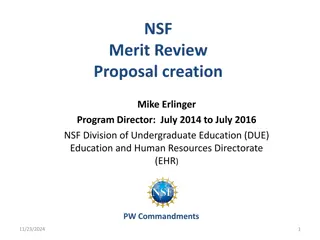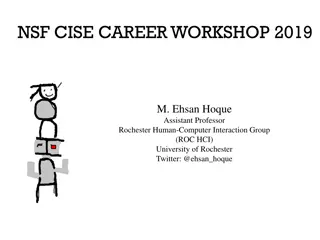NSF Career Workshop 2021 - Proposal Process & Requirements
This workshop provides valuable information on the NSF CAREER proposal process, eligibility criteria, submission requirements, and tips for a successful application. Learn about the importance of long-term, impactful proposals that integrate research and education, and how to address broader impacts and evaluation effectively. Get insights from faculty with CAREER awards and NSF panel experience, and understand the key elements to consider in your submission. Don't miss the opportunity to enhance your understanding and preparation for this prestigious grant opportunity.
Download Presentation

Please find below an Image/Link to download the presentation.
The content on the website is provided AS IS for your information and personal use only. It may not be sold, licensed, or shared on other websites without obtaining consent from the author.If you encounter any issues during the download, it is possible that the publisher has removed the file from their server.
You are allowed to download the files provided on this website for personal or commercial use, subject to the condition that they are used lawfully. All files are the property of their respective owners.
The content on the website is provided AS IS for your information and personal use only. It may not be sold, licensed, or shared on other websites without obtaining consent from the author.
E N D
Presentation Transcript
NSF CAREER WORKSHOP #2 (2021) Tandy Warnow
Today Tandy Warnow: Brief overview of the CAREER proposal process and requirements Hannah Gorie: Assistance to applicants (e.g., Nancy s letter) Advice from faculty who have received CAREER awards and/or been on NSF panels for CAREER awards Recommendations Q&A
Eligibility Assistant professor ( tenure track equivalent , so research and education) Must have doctorate in relevant field Do not need to be tenure-track (but must be at least 50% time) Can have prior NSF funding, but not CAREER award Limited to three tries (at most one each year)
CAREER proposals Not just any proposal: should be long term, ambitious, and high impact. Emphasis on innovation in teaching/education Emphasis on integration of research and education Your proposal may be read by people far outside your field: make it easy to understand and the clear potential for high impact Pay attention to broader impacts , including broadening participation Make sure to include evaluation of research, education, and broader impacts activities
Basic information Deadline: July 26, 2021 (5 PM local time) Eligibility: (a) hold doctorate, (b) be performing research in an area relevant to NSF, (c) be untenured assistant professor at least 50% time (tenure-track, teaching faculty, research faculty, etc.), (d) have applied for CAREER at most twice Budget: at least $400K for CISE proposals (includes indirect) over 5 years (unless submitted to BIO, ENG, or OPP) Can only submit one NSF CAREER proposal in each year See CS department wiki for resources https://wiki.illinois.edu/wiki/display/facstaffinfo/Big+Research+Initiatives+Wiki https://www.nsf.gov/funding/pgm_summ.jsp?pims_id=503214
Proposal requirements All the usual requirements of NSF proposals, plus some extras Letter from department head (Nancy) you draft it! (See Hannah) Note: Use Fastlane instead of Grants.gov (recommendation) No Co-PIs allowed Collaboration is allowed but should be minimized Be careful about compliance issues (URLs in proposals, font size, use of et al , etc.) Recommended timeline posted by NSF strongly suggests submitting a week ahead *to NSF* (not just to SPA) https://www.research.gov/common/attachment/Common/Career_deadline.pdf
Return without Review Submitted after deadline The proposed work duplicates, or is substantially similar to, a proposal already under consideration by NSF from the same submitter The proposal was previously declined and was not revised to take into account the major comments from the prior NSF review The proposal topic falls outside the purview of NSF
Project Description The Project Description should include: a description of the proposed research project, including preliminary supporting data where appropriate, specific objectives, methods and procedures to be used, and expected significance of the results; a description of the proposed educational activities and their intended impact; a description of how the research and educational activities are integrated or synergistic; a description of other broader impacts, besides the education activities, that will accrue from the project; and results of prior NSF support, if applicable.
CAREER proposals Not just any proposal: should be long term, ambitious, and high impact. Emphasis on innovation in teaching/education Emphasis on integration of research and education Your proposal may be read by people far outside your field: make it easy to understand and the clear potential for high impact Pay attention to broader impacts , including broadening participation Make sure to include evaluation of research, education, and broader impacts activities
CS faculty and staff can help Advice from the web, see http://tandy.cs.illinois.edu/nsf-career.html Department faculty may be willing to share their proposals and letters from Nancy: contact, for example, Chris, Bo, Sasa Successful CAREER proposals (but not recent ones) on department website
Recommendations July 2 Read the solicitation and PAPPG carefully, identify questions Log into Fastlane Schedule and have initial meeting with mentor(s), and discuss proposal ideas Look at NSF website for guidance, possibly contact NSF program directors, pick one or two divisions at NSF to apply to Write one page project summary, plus 1-3 page overview, and NSF Biosketch; submit to mentor(s) Discuss budget with your assigned grants person Make sure Nancy knows you are planning to submit July 5: revise project summary, write 5 page outline of proposal, provide to mentor(s) Begin proposal preparation in Fastlane Start budget July 12 Have full draft of proposal, provide revised full draft to mentor(s) and to Nancy (!) Complete Fastlane documents (check for completion) Finalize budget July 19-26: REPEAT: revise draft, send to mentors, until done
Advice about writing proposals Make your proposal beautiful to look at (use images, white space) Don t leave typos, do care about writing Check for compliance (e.g., URLs, et al. ) Check for required elements Put yourself in the mind of the reviewer, and especially a grouchy one Read about proposal writing, for example https://grantwriting.stanford.edu/students/tips-for-planning-your-proposal/
What else? I am happy to read proposals and help with brainstorming Other faculty also happy to help (and can share their proposals) Get as much feedback as you can Start early, revise, revise, revise Submit well ahead of deadline See my website https://tandy.cs.Illinois.edu/nsf-career.html
